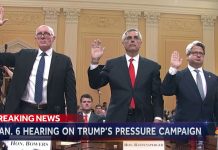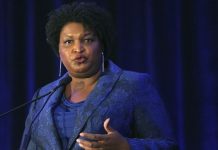Three Republican state officials and a former Georgia elections worker combined to deliver a coruscating indictment of former President Trump during Tuesday’s hearing of the House select committee investigating the Jan. 6, 2021, Capitol riot.
Each of the witnesses testified about the threats unleashed upon them as Trump and his team propagated false claims of election fraud in an effort to overturn President Biden’s victory in the 2020 election.
They also emphasized, again and again, the failure of Trump and his allies to produce evidence to support those claims.
Rusty Bowers (R), the Speaker of the Arizona state House, recounted a phone call with Trump attorney Rudy Giuliani. Bowers said Giuliani claimed, “We’ve got lots of theories, we just don’t have the evidence.”
That statement seemed so damning that Bowers wondered if Giuliani had made the comment inadvertently, he testified.
Moments later, referring to separate promises by Team Trump to furnish him with evidence of fraud, Bowers said, “No one provided me — ever — with such evidence.”
Brad Raffensperger, the secretary of state in Georgia who recently survived a primary challenge from a Trump-backed opponent, was subject to a now-infamous January 2021 phone call from Trump in which the then-president demanded, “I just want to find 11,780 votes” — the exact number required to reverse Biden’s victory in the state.
“There were no votes to find,” Raffensperger testified. “Every single allegation we checked.”
Raffensperger calmly addressed what he sees as the real reason for Trump’s defeat in the Republican-leaning state: the former president’s tendency to turn off even some GOP voters.
“Twenty-eight thousand Georgians skipped the presidential race and they voted down ballot in other races,” Raffensperger said. “That’s why President Trump came up short.”
Perhaps the most emotional testimony of the day came at the hearing’s end, however, when a former elections worker in Georgia, Wandrea ArShaye Moss, testified about the impact on her life and that of her mother, also an elections worker, when Trump allies, including Giuliani, falsely claimed they were directly involved in fraud.
Moss testified that a supposed USB drive that the two were alleged to be passing between each other were actually ginger mints.
But she also referred to her shock when those allegations were made publicly, which resulted in a barrage of threatening messages on social media.
Asked by Rep. Adam Schiff (D-Calif.) whether the threats were racist, Moss, who is Black, replied, “A lot of them were racist, a lot of them were just hateful.”
A visibly emotional Moss also recounted her guilt about the threats that had been made against her mother and grandmother, which caused her to question whether she herself was at fault for volunteering to work at the polls.
The committee, which has made frequent use of video clips of depositions and other testimony, also included a clip from Moss’s mother, Ruby Freeman, in which she said, “Do you know how it feels to have the president of the United States target you? The president of the United States is supposed to represent every American, not to target one.”
Previously, Raffensperger had recounted attacks on him, “sexualized” threats against his wife and a break-in at his daughter-in-law’s property, all of which appeared to be related to his refusal to do Trump’s bidding.
Bowers recounted threatening protests outside his home that he said were “a pattern in our lives” that had upset his family, including his then “gravely ill daughter,” who later died.
Gabriel Sterling, the chief operating officer within the Georgia secretary of state’s office, said he had been moved to give an outraged press conference amid the post-election tumult when he saw a death threat featuring a noose on social media.
Together, the testimonies gave Tuesday’s hearing, the fourth, an emotional heft greater than any barring the first, which was broadcast in prime time on June 9 to an audience of around 20 million people.
But whether it changes anything legally or politically is of course a different matter.
Views of Jan. 6 cleave deeply along partisan lines, although some polling shows the share of Americans who believe Trump should be criminally prosecuted has ticked up modestly.
From the standpoint of criminal prosecution, Raffensperger’s secret testimony to a special grand jury in a probe in Georgia might ultimately matter more than what he said on Tuesday.
One revelation from Tuesday’s hearing was centered not on Trump, but on Sen. Ron Johnson (R-Wis.).
The committee showed texts from an aide to Johnson to an aide to then-Vice President Mike Pence, in which the Johnson aide said the senator wanted to give “alternate” slates of electors for Wisconsin and Michigan to the vice president.
The Pence aide apparently responded, “Do not give that to him.”
A short time later Tuesday, a Johnson spokeswoman tweeted: “The senator had no involvement in the creation of an alternate slate of electors and had no foreknowledge that it was going to be delivered to our office. This was a staff-to-staff exchange.”
SOURCE ⇒ THEHILL


































